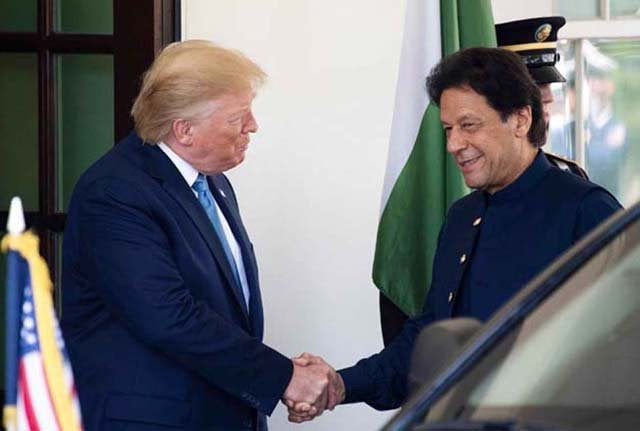Incredible encounter
The 70-year-long history of the Pakistan-US relations tells us that the US has wooed us whenever it needed

US President Donald Trump and Prime Minister Imran Khan. PHOTO: AFP
Not only that, the US President has even promised to consider resuming the military assistance that he himself had cut off in early 2018 after blaming Pakistan of playing a double game in Afghanistan. He even talked of enhancing the bilateral trade between the US and Pakistan by 20-times! He further made us all very happy by praising our PM to the skies, calling him the most popular leader in Pakistan and describing the people of Pakistan as ‘fantastic’ and our products as the very best.
The fact that he has promised our very dream-list presumably in return for what he probably expects Pakistan to deliver on Afghanistan, and not because of what we have already contributed so far to facilitate the ongoing negotiations between US Representative Zalmay Khalilzad and Afghan Taliban representatives led by Mullah Baradar in Doha, Qatar. Had that been the case, the recently concluded meeting between the Pakistani and American leadership would have resulted in more substantive announcements rather than just promises.
Perhaps Trump wants Pakistan to persuade the Taliban to talk to the Kabul government on the future shape of government and governance in Afghanistan once the occupying troops finally withdraw from the country. Perhaps Trump wants Imran to get the Taliban to end the ongoing violence to pave the way for a peaceful conclusion of the war. Only then would Trump probably consider turning the promises he made on July 22nd into concrete goodies.
Of course, Islamabad should be doing its level best to facilitate the ongoing talks to reach a peace accord acceptable to all parties concerned, because we would be the biggest beneficiaries of an Afghanistan at peace with itself and the world.
But then we should also be wary of the end-game’s adverse impact, if any, on Pakistan. The 70-year-long history of the Pakistan-US relations tells us that the US has wooed us whenever it needed us to promote its global agenda in the region and once that has been achieved, Washington has abandoned Islamabad without so much as your leave. Field Marshal Ayub Khan who signed the CENTO and SEATO pacts with the US in the mid-1950s for helping keep the Soviet communism from entering the region, was the darling of Washington until he realised the friendship was only one-sided, which made a disillusioned Ayub to write a book appropriately titled “Friends, not masters”. After the CIA — with the help of the Pakistani ISI and Afghan Mujahideen — succeeded in defeating the Soviet troops in Afghanistan, Washington simply walked away leaving the entire aftermath mess on Pakistan. As a result, Pakistan became the most sanctioned country in the world during the 1990s after Libya. The senior Bush had invoked the Pressler Amendment in early 1990s, sanctioning Pakistan for crossing the ‘nuclear red-line’. Then we were sanctioned for the Kargil misadventure followed immediately for testing the nuclear devices which invoked the Glen Amendment and ended the decade with sanctions for the October 1999 military takeover. Finally by mishandling the War on Terror and failing to bring peace in Afghanistan even after 18 years of war which cost the US $50 billion annually, the US kept passing the blame for its failures on to Pakistan, despite it costing Pakistan over 70,000 lives including thousands of security personnel, and billions of dollars.
Published in The Express Tribune, July 27th, 2019.
Like Opinion & Editorial on Facebook, follow @ETOpEd on Twitter to receive all updates on all our daily pieces.















COMMENTS
Comments are moderated and generally will be posted if they are on-topic and not abusive.
For more information, please see our Comments FAQ